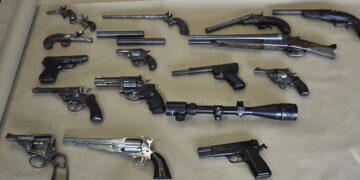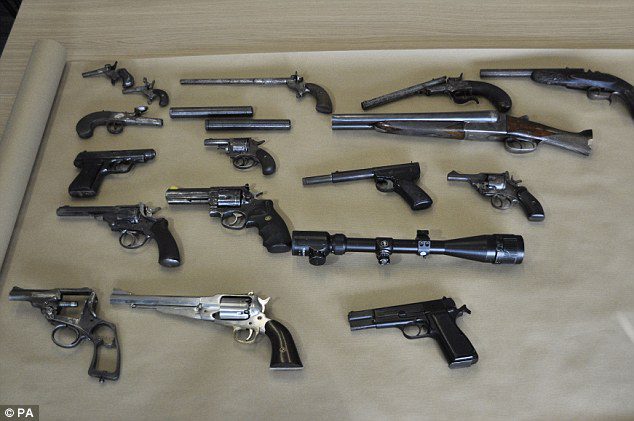The National Commission on Small Arms and Light Weapons has reiterated its commitment to controlling the proliferation of firearms in Ghana, as the country continues to grapple with the misuse of weapons at social events and the growing presence of illicit arms, especially in illegal mining areas.
Speaking in an interview on Happy 98.9FM’s Happy Morning Show, Gyebi Asante, Deputy Director and Head of Policy Planning, Monitoring and Evaluation (PPME) at the Commission, explained the difference between small arms and light weapons. “Small arms are weapons like pistols which can be operated by one person, while light weapons are those that require two or more individuals to operate,”he said.
According to Mr. Asante, the Commission was established not only to regulate the use and ownership of firearms but also to educate the public on their dangers. He noted that many Ghanaians mistakenly believe owning a firearm ensures safety, yet often overlook the serious repercussions associated with their misuse.
“People now use guns at funerals, weddings, and other public events. This is very concerning”. he cautioned.
Mr. Asante clarified that Ghanaian law permits private ownership of firearms, but only through legal procedures. “The law allows people to acquire guns legally for self-defense or protection of property, but only under strict conditions,” he explained.
He elaborated that licensed arms dealers, approved by the government, are permitted to import and sell firearms. “These dealers write to the Minister for the Interior for approval. Once all the required documentation is verified, they’re allowed to purchase from a private magazine a location that’s not publicly advertised,” he said.
Regarding the types of firearms permitted, Mr. Asante explained that civilians are only allowed to use certain categories. “For civil use, weapons like single-barrel or double-barrel shotguns are allowed. These are licensed by the police. However, sidearms like pistols require direct approval from the Interior Minister, with justification for personal protection,” he stated.
The law also sets clear eligibility criteria for owning a firearm: applicants must be 18 years or older, mentally sound, without a criminal record, and firearms cannot be transferred to other persons.
Touching on illegal arms trafficking, Mr. Asante acknowledged that firearms enter the country through both approved and unapproved means. “Despite official processes at the borders, some firearms still find their way into the country through smuggling. Demand is especially high in areas like galamsey (illegal mining), where guns are used for protection,” he said.
To counter the threat of illegal arms, the Commission has implemented a Weapons Destruction Programme aimed at reducing the number of unregistered firearms in circulation. “In 2016, we destroyed a significant number of weapons. In 2018, over 2,000 were destroyed, and in 2020, just before the elections, we destroyed 1,194 firearms in Takoradi,”Mr. Asante recalled. “If it were up to us, we would conduct these destructions every year.”
He also emphasized that many of the destroyed weapons were recovered from crime scenes, and called for improved collaboration among security agencies. “We are still working with civil agencies and continuing public education, but there’s room for greater coordination,” he noted.
The Commission urges the public to remain vigilant and responsible in the use and handling of firearms, and to report any suspicious firearm-related activity to the appropriate authorities.




















